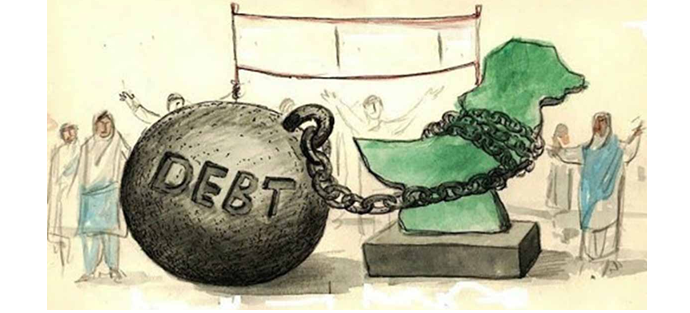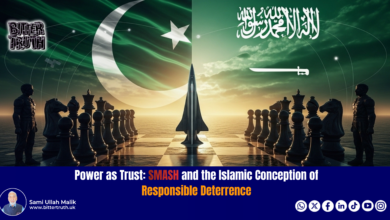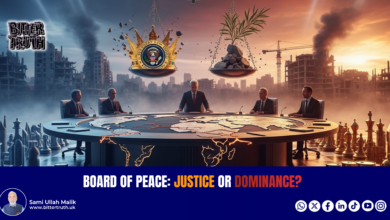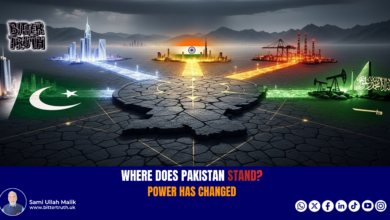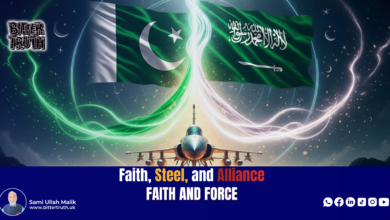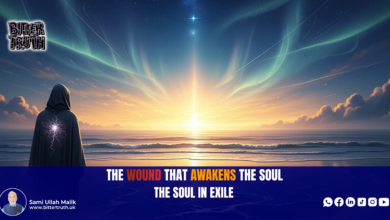Power and Struggle
Every year when the month of August begins on the calendar, the greatest miracle of this century and the greatest blessing from the Lord of the Universe, “Pakistan,” demands a prostration of gratitude from all of us as the fulfillment of our dreams. The greatest achievement of Quaid-e-Azam’s leadership is the creation of Pakistan. But what is the reality of the establishment of Pakistan? Is it a coincidence of the political situation of the Indian subcontinent, a historical accident, a conspiracy to dismantle British India, or the result of the application and reaction of divine laws for human society? The truth is that Pakistan in the modern era is the declaration of the global Muslim Ummah’s revival, and it is also true that we…
ستیزہ کار رہا ہے ازل سے تا امروز
چراغِ مصطفوی سے شرار بولہبی
He has been a critic since time immemorial
The torch of Mustafa has been fighting against the spark of Abu Lahab.
With the end of the Ottoman Empire in 1924, the nominal centrality that Muslims had was also abolished, and the powers harbouring eternal hatred and animosity towards Muslims breathed a sigh of relief. However, 16 years after this event, in 1940, the Muslims of the subcontinent announced their demand for Pakistan, asserting their global religious identity. Upon reflection, it becomes clear that by demanding the establishment of Pakistan, the Muslims of the subcontinent collectively performed the duty of following the Sunnah of the Prophet Muhammad (PBUH) in principle. Our true guide, the Prophet Muhammad (PBUH), formed a global Muslim Ummah based on the bond of faith. The Muslims of the subcontinent renewed this identity in the modern era. The Prophet Muhammad (PBUH) selected the land of Yathrib for the first Islamic state, and the Muslims of the subcontinent declared that by giving their majority areas the shape of an independent and sovereign state, they would make it a “laboratory of practical Islam” in the modern era. Yathrib became Medina, the city of the Prophet (PBUH), and this region became Pakistan.
Another astonishing fact is that the number of Muslims in the subcontinent was the highest compared to other parts of the world, and when Pakistan was demanded, there were around 100 million Muslims here. However, compared to the Hindu majority, this number was very small, roughly one-fourth. Keeping this numerical deficiency in mind, consider the 26th verse of Surah Al-Anfal in the Quran, where it is stated:
وَاذْكُرُوا إِذْ أَنتُمْ قَلِيلٌ مُّسْتَضْعَفُونَ فِي الْأَرْضِ تَخَافُونَ أَن يَتَخَطَّفَكُمُ النَّاسُ فَآوَاكُمْ وَأَيَّدَكُم بِنَصْرِهِ وَرَزَقَكُم مِّنَ الطَّيِّبَاتِ لَعَلَّكُمْ تَشْكُرُونَ
And remember when you were few and oppressed in the land, fearing that people might abduct you, but He sheltered you, supported you with His victory, and provided you with good things – that you might be grateful.
آں کتاب زندہ،قرآن حکیم
حکمت ولایزال است وقدیم
This living book, the wise Quran,
Is eternal and ancient wisdom.
Pakistan came into existence as an interpretation of this Quranic guidance in the modern era and as a symbol of the renaissance of Islam. In this historic process, the leadership of Quaid-e-Azam Muhammad Ali Jinnah played a fundamental and pivotal role. This is a very high status, and from this perspective, there is also a need to contemplate the personal character of Quaid-e-Azam, considering how Islamic teachings and his heartfelt connection with the revered personality of the Prophet Muhammad (PBUH) interconnected and organized both his personal and political lives. Quaid-e-Azam enrolled at “Lincoln’s Inn” in Britain to study law because there, among the world’s leading lawmakers, the revered name of our Prophet Muhammad (PBUH) was inscribed. Then, half a century later, during the transfer of power at the time of Pakistan’s establishment, when Lord Mountbatten sarcastically remarked, “I hope that minorities will be treated with the same tolerance in Pakistan as was done in the era of Akbar the Great,” Quaid-e-Azam promptly responded, “Muslim tolerance is not limited to the era of Akbar the Great. More than thirteen centuries ago, our beloved Prophet Muhammad (PBUH) conquered the Jews and Christians and treated them not only justly but generously.”
The bright ray of connection with the Prophet Muhammad (PBUH) in the heart of the young Quaid became a guiding light for him in the extremely challenging journey of politics. On a personal level, Quaid-e-Azam may have had flaws, but the effects of these flaws remained limited to his person or those related to him, while the impacts of his virtues were evident in his leadership, the energy of which had lasting and historic effects on the collective life of the Muslims of the subcontinent.
The remarkable feat of establishing Pakistan accomplished by Quaid-e-Azam would not have been possible without the trust that all the Muslims of the subcontinent had in his leadership. He never misled the Muslims of the minority provinces, but clearly and repeatedly declared that Pakistan would be established in the majority provinces, and the Muslims of the minority provinces would have to make sacrifices for this great cause. The uniqueness of the freedom of the land of Pakistan is that even those Muslims who had no direct connection to this land willingly made sacrifices for its freedom because they were fully aware of the demands of the bond of faith with the Muslims residing here. There is no other example of this in history. This was the charisma of Quaid-e-Azam’s leadership, and that charisma was rooted in truth, trustworthiness, and honesty. He never resorted to emotional slogans. He faced two major powers: the Hindu Congress leadership and the British government. Materially, the situation was dire; Muslims were scattered and divided, but they had the energy of faith. Quaid-e-Azam’s truthful leadership awakened the consciousness of this faith energy among Muslims. Real power belongs to unseen forces. Faith is unseen energy, but it overcomes all visible forces, and this is the truth:
آج بھی ہو جو براہیم کا ایماں پیدا
آگ کرسکتی ہے اندازِ گلستاں پیدا
Even today, if faith like Abraham’s is created,
Fire can create a garden-like environment.
Consider the obstacles faced during the creation of Pakistan, the intense conspiratorial schemes of its opponents, and the massacres carried out to prevent Pakistan from being established on solid foundations. Reflect on the determination, the resolve, and the decisive spirit of construction that turned what seemed impossible into reality. The creation of Pakistan holds special significance in the contemporary revival of Islam. As stated in Surah Al-Imran, Ayah 54:
وَمَكَرُوْاوَمَكَرَ اللّٰهُؕ-وَاللّٰهُ خَیْرُالْمٰكِرِیْنَ
And the disbelievers planned, but Allah planned. And Allah is the best of planners.
Similarly, in Surah Ibrahim, Ayah 46, it is mentioned:
وَقَدْمَكَرُوامَكْرَهُمْ وَعِندَ اللَّهِ مَكْرُهُمْ وَإِن إِن كَانَ مَكْرُهُمْ لِتَزُولَ مِنْهُ الْجِبَالُ
And they had planned their plan, but with Allah is [recorded] their plan, even if their plan had been [sufficient] to do away with the mountains.
The truth is: When all paths of human effort are blocked, The way to the land of the Friend opens from there.
Reflect on these Quranic teachings and consider the events from the creation of Pakistan to its emergence as a nuclear power; the workings of divine planning in human society will become evident. One reason for the creation of Pakistan was the intense prejudice and political conspiracies of our opponents. Every possible effort was made to destabilize the creation of Pakistan, but every attempt failed. The process that provided the best argument for us was India’s nuclear test. It is essential to continuously contemplate Pakistan’s internal situation and its regional and global impacts. Internally, we are undergoing phases of social purification, but after 9/11, the regional situation has completely changed. The enemies of Pakistan have attacked us like ravenous wolves, and a corrupt and immoral general threw us into a whirlpool of dangers before fleeing, and later, he was called to account by Allah. The current government is even ten steps ahead of him, making the difficulties seem mountainous. The regional impact of Pakistan’s creation was that India could not establish its dominance over the entire area, and the global impact was that Islam became increasingly prominent on a global scale. However, our misdeeds and disobedience have shown us these dark days, where a nuclear power has been rendered so economically weak that global vultures circle around it day and night.
Time has two measures: days and nights, and months and years. One measure Allah has set for our deeds, and the other is Allah’s own measure, where one ‘day’ is equivalent to a thousand years or even more by our reckoning. In the era of the Holy Prophet (PBUH), the laws established by Allah for human society and human actions were in perfect harmony, resulting in the creation of an exemplary society and state in the light of complete history. Muslims spread the light of this exemplary society as far as possible. The journey of time and human society continues in this direction, but we Muslims have forgotten our duty for centuries to spread the light of our faith and deeds to accelerate this journey. The creation of Pakistan has provided us with another opportunity in the contemporary era to fulfill our role of faith. Over the past 75 years in Pakistan, by neglecting our duties or being unaware of them, we have wasted time and caused loss to humanity. We will all have to answer to Allah for this loss according to our responsibilities. Do we truly believe that we will be held accountable? Are we aware of the fact that accountability is inevitable, and it will surely happen? With the creation of Pakistan, we have accepted a great responsibility.
Unaware, you are the essence of the mirror’s message,
You are God’s last message to the world.
However, the concluding words of the last verses of Surah Muhammad also say:
وَإِن تَتَوَلَّوْايَسْتَبْدِلْ قَوْمًاغَيْرَكُمْ ثُمَّ لَايَكُونُواأَمْثَالَكُم
And if you turn away, He will replace you with another people; then they will not be the likes of you.
” This is our greatest test at present. If only we could realize that being devoid of the fear of Allah is the greatest deprivation, the most destructive deprivation, which cannot be compensated for in any way.
The reality is that Pakistan will be 77 years old on 14th August, but since 1971, 2019 has been the worst year in history. It should be remembered that our homeland has been oppressed from the very beginning due to the conspiracies of Ayub Khan, Ghulam Muhammad, and Justice Munir. In 1968, Ayub left. Yahya and Bhutto laid the foundation for Bangladesh, but the real cause of the division was Ayub, and then in 1971, our homeland was divided. The devastation began with the fiery oratory of Bhutto. The rigged elections of Bhutto led to the martial law of Zia-ul-Haq in 1977, which lasted until 1988. Then, from 1988 to 1993, under the generals, there were brief tenures of Benazir and Nawaz Sharif, followed by their short terms again from 1993 to October 1999. After that, there was the nine-year dictatorship of Pervez Musharraf from 1999 to August 2008. The misfortune and tragedy of the nation were also that Saqib Nisar revived the worst memories of Justice Munir, who even today receives lakhs of rupees monthly from the country’s treasury for his luxuries.
Reflect on the hurdles faced during the establishment of Pakistan, the conspiracies hatched by adversaries, and the bloodshed that ensued to prevent Pakistan from being founded on stable grounds. The determination and decisive action that transformed the seemingly impossible into reality are remarkable. The creation of Pakistan holds special significance in the modern era concerning the revival of Islam. As mentioned in Surah Al-Imran, Ayah 54: “And they planned, and Allah also planned, and Allah is the best of planners.” Similarly, in Surah Ibrahim, Ayah 46: “And they had planned their plan, but with Allah is their plan, even if their plan had been enough to do away with the mountains.”
Consider these Quranic verses and reflect on the events from the establishment of Pakistan to its emergence as a nuclear power. The divine planning for human society becomes evident. One reason for the creation of Pakistan was the intense prejudice and political machinations of our adversaries. Every effort was made to destabilize Pakistan, yet all attempts failed. The most compelling justification for our emergence as a nuclear power was India’s nuclear test. It is essential to continuously ponder Pakistan’s internal situation and its regional and global implications. Internally, we are undergoing phases of social purification, while the post-9/11 regional situation has drastically changed. Pakistan’s enemies have attacked us like ravenous wolves, and a corrupt general threw us into a whirlpool of dangers before fleeing, only to later meet his end before God. The current government is even worse, creating challenges that seem insurmountable.
The regional impact of Pakistan’s establishment was that India could not dominate the entire area, and globally, Islam continued to gain prominence. However, our misconduct and disobedience have shown us dark days, where a nuclear-armed nation has been economically weakened to the point that international vultures are constantly circling. Time has two measures: day and night, and months and years. One measure is for our deeds, and the other is God’s reckoning, where one day could be equivalent to a thousand years or more. During the era of the Prophet Muhammad (PBUH), there was complete harmony between God’s laws for human society and human actions, resulting in an exemplary society and state. Muslims spread the light of this exemplary society wherever they could. Although humanity’s journey is still in the same direction, Muslims have forgotten their duty to spread the light of faith and deeds for centuries. The establishment of Pakistan has given us another opportunity to fulfill our role in modern times.
Pakistan’s creation has placed a significant responsibility on us. If we fail to recognize and fear God, this will be the most devastating loss. Pakistan will turn 77 years old on August 14, but the period from 2019 to now has been the worst since 1971. The nation has suffered from the conspiracies of figures like Ayub Khan, Ghulam Muhammad, and Justice Munir from the very beginning. Ayub’s fall in 1968, Yahya and Bhutto’s role in the creation of Bangladesh, and the turmoil of Bhutto’s era have all contributed to the nation’s suffering. The military rule of Zia-ul-Haq from 1977 to 1988, and the brief tenures of Benazir Bhutto and Nawaz Sharif under the generals, have also left deep scars. General Musharraf’s nine-year rule from 1999 to 2008 further added to the nation’s woes.
The presidency of Zardari and the five-year rule of the PPP under Gilani and Raja Ashraf, followed by Nawaz Sharif’s third brief tenure and the allegations of conspiracies involving General Pasha and Zaheer-ul-Islam, compounded the nation’s troubles. Imran Khan’s rise to power with General Bajwa’s support from 2018 to April 2022 led to increased foreign debts and the controversial handling of the Kashmir issue. Imran’s theatrics, including grandstanding on his return from the US, failed to deliver on promises regarding Kashmir, while General Bajwa’s reluctance to engage in conflict left the nation disillusioned.
The internal rift between Bajwa and Imran over the appointment of the ISI chief culminated in a vote of no confidence. Despite attempts to save his government, including offers of extending Bajwa’s tenure, Imran was ousted, and the PDM coalition took over. The PDM’s brief rule saw laws to end corruption cases, a sharp decline in the Pakistani rupee’s value, and the country teetering on the brink of bankruptcy. The nation, weary of constant political drama, faces a precarious situation with accusations and counter-accusations of corruption and incompetence.
The military’s imposition of martial law would result in sanctions, and giving power to Imran Khan would lead to further devastation. The media and Imran Khan hinder the PDM government’s efforts, while the judiciary’s role remains questionable. The nation is sinking under the burden of interest-based loans, with the State Bank under IMF control and a growing trade deficit. The current situation demands that the military unite all factions, impose a three-year emergency, and establish a technocratic national government comprising all political parties to stabilize the economy. However, obstinate politicians are unlikely to agree to such a national government to save the country from bankruptcy.
The situation is reminiscent of 1971 and 1977, with accusations of dishonesty and corruption creating a dangerous environment of polarization. The nation is divided, and the threat of civil war looms large. The entire nation now beseeches God for mercy and prays for righteous leadership to steer Pakistan through these testing times. Amen.

